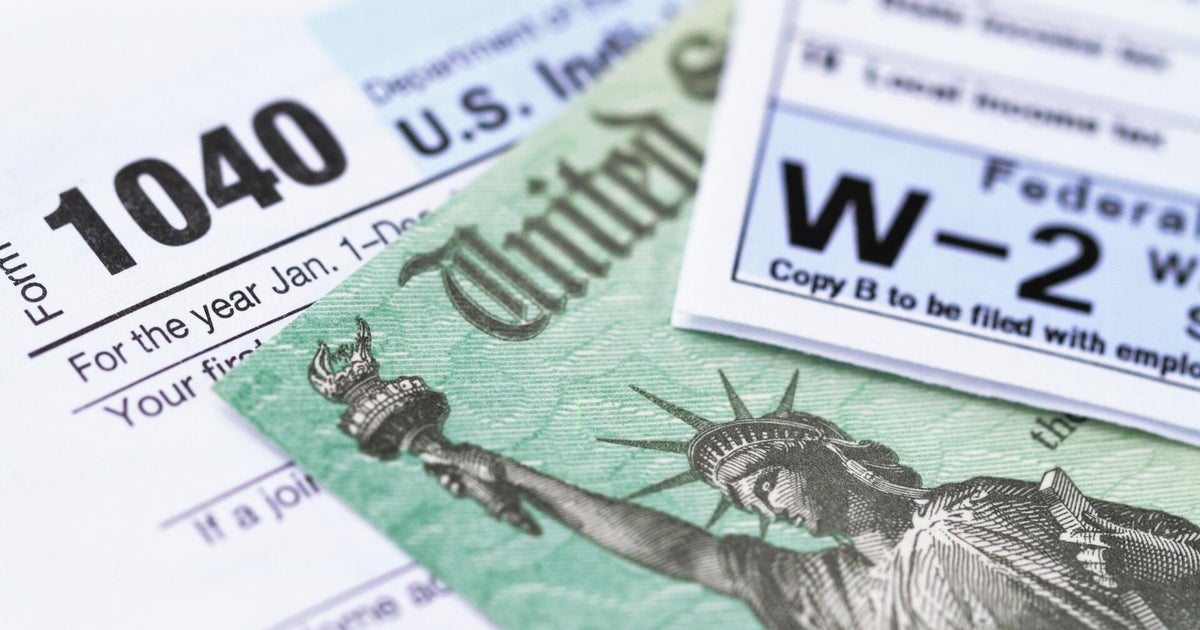Third stimulus check: Why some people should file their taxes ASAP
With lawmakers negotiating another round of coronavirus relief aid, many Americans are eager to learn if and when they'll receive a third stimulus check. Aside from Congress' time frame for passing the legislation, there's another factor that could influence stimulus payments: your 2020 tax returns.
The reason boils down to the confluence of tax-filing season and the expectation that Congress will pass the next relief bill by mid-March. The IRS officially started accepting tax returns on February 12, but said that the filing window will close on its customary date of April 15. The American Institute of CPAs earlier this month urged the IRS to announce by March 1 if it intends to extend the tax filing deadline for all taxpayers.
So far, the IRS has only extended the tax deadline for residents of Texas, who have until June 15 to file their returns due to the deadly storms that hit that state.
The current timeline effectively means the agency may start distributing stimulus checks in the middle of tax season, which could affect how much Americans get — especially households that lost income last year or who had a child in 2020. The reason: The IRS relies on each individual's most recent tax filing to determine their stimulus check payment.
If a taxpayer doesn't file their 2020 tax returns before Congress passes its next relief bill, the agency will likely rely on their 2019 tax return to calculate their stimulus check payment — and that 2019 return might not reflect income losses during last year's economic crisis or a new child, for example.
"I would suggest that people file as soon as possible, especially with 75% of taxpayers last year receiving a tax refund close to $3,000," said Lisa Greene-Lewis, a tax expert at TurboTax. "We are hearing a lot of people say, 'I had a baby in 2020, how will the IRS know this? When they issued the previous stimulus payment they didn't know that.'"
To be sure, there's another reason to file early: To get your tax refund as soon as possible, especially if you are owed some money from either one or both of the past stimulus checks. For instance, people who had a baby in 2020 would be entitled to an additional $1,100 in stimulus money ($500 from the first round, and $600 from the second round), which they can claim on their 2020 tax returns.
Any additional money owed from the past two stimulus checks will be sent through refund checks this year, the IRS said.
Ongoing negotiations
Currently, lawmakers are negotiating details of the next stimulus package, including what income thresholds should apply for the next round of checks, called Economic Impact Payments. Under one plan, Democrats could lower the annual income thresholds to qualify for a payment to $50,000 or less for single people and $100,000 or less for married couples, according to the Washington Post.
On February 8, however, House Democrats pushed back on those lower income limits, proposing to keep the income thresholds at the same level as for the previous checks. That would ensure the full $1,400 relief payments would go to individuals making $75,000 or less, while couples earning $150,000 would be entitled to $2,800 relief payments. The payments would ratchet down for incomes above those levels, phasing out entirely for single people earning $100,000 or more and couples earning $200,000 or more.
In a CNN Townhall in Wisconsin on February 16, Mr. Biden emphasized that he's committed to passing a large stimulus bill, noting that economists believe a significant investment can help the economy recovery in the short- and long-term. "That overwhelming consensus is, in order to grow the economy a year, two, three and four down the line, we can't spend too much," Mr. Biden said. "Now's the time we should be spending. Now is the time to go big."
Lawmakers could move forward with the bill in the next couple of weeks, sending it to Mr. Biden for his signature, Treasury Secretary Janet Yellen told CNBC on February 18.
"President Biden has discussed the checks with Republicans and members of Congress," she said. "He wants to make sure that they're appropriately targeted so they go to people in need. You know, not to very high-income people who don't need it."
Why filing taxes ASAP could get you more
Taxpayers should consider two issues: Their income in 2019 versus 2020 and whether they had a child last year, noted Mark Jaeger, director of tax development at TaxAct.
Take a single worker who earned $90,000 in 2019 but who lost her job during last year's massive layoffs and ended up earning $45,000 in 2020. If she doesn't file her 2020 tax returns by the time Congress passes the next relief bill, the IRS would likely base her third stimulus check on her 2019 earnings.
In that case, she would most likely receive less than $1,400 because the IRS would use her 2019 earnings of $90,000 to determine her payment. (The exact amount would depend on the phase-out amounts set by the legislation.) But if she files her 2020 tax return as soon as possible, the IRS will record her most recent annual income as $45,000 — qualifying her for the full $1,400 payment based on the income thresholds now under discussion.
The same situation could occur for people who welcomed a child into their family in 2020. If the IRS relies on their 2019 tax return, the agency won't be aware of the new family member. As a result, the claimant wouldn't get the proposed $1,400 payment for a dependent to which they're entitled.
There could be a downside to filing early, particularly for people whose income rose in 2020, compared with 2019, and exceeded the income threshold. If that's the case, Jaeger said, you may want to wait until after the legislation is passed to file your taxes.
Take a single taxpayer who earned $70,000 in 2019, but got a promotion and earned $90,000 in 2020 — which is $40,000 above the salary limit for the full stimulus payment.
"You are now in that threshold of phasing out," Jaeger said. "You are better waiting because the IRS will use your 2019 info" to determine your third stimulus check.
To be sure, the details of the third stimulus checks are still fluid, and the rules could end up differing from the two previous stimulus checks, noted Eric Bronnenkant, head of tax at financial services firm Betterment. But, he added, "It's more likely that someone's income went down in 2020 and that filing sooner would then help them qualify for more money."
Adjustments later?
It's possible the IRS could create a way to reconcile stimulus payments later this year, Jaeger said. For instance, if your income fell in 2020 but you don't file your taxes before the next relief bill is passed, that could allow taxpayers to claim the additional funds in the summer — rather than waiting until next year's tax filing.
The IRS is keeping an eye on the stimulus bill taking shape in Congress and "building a number of contingencies based on any new legislation," said Ken Corbin, the new chief taxpayer experience officer at the IRS, in a February 11 conference call with reporters. "We are thinking through what is that experience for taxpayers who might be entitled for more."
He added, "If someone is able to file an accurate return sooner, then we encourage them to file that return as soon as they are able to."
Stimulus checks and taxes
Taxpayers who didn't receive their full stimulus payments in the first two rounds of checks may also want to file their 2020 tax returns quickly. By doing so, they'll be able to claim the additional money on Form 1040s through what the IRS calls the Recovery Rebate Credit, or an adjustment between what you received from the IRS versus what you should have gotten — such as if your income decreased or you had a child in 2020.
As of February 10, the IRS said it has issued all the first and second stimulus payments it is "legally permitted to issue." On the February 11 conference call with reporters, IRS officials said they had issued more than 140 million payments for the second stimulus check, compared with 160 million of the first stimulus check.
The second stimulus check had a lower income phaseout, which means fewer households may have qualified for a check. But there could be instances where people didn't receive the check, such as if the IRS didn't have an active bank account for direct deposit or a current address for the recipient. In that case, the IRS says people can claim the second stimulus check on their 2020 tax return.
The IRS has published a Recovery Rebate Credit worksheet to walk through whether you could receive extra funds. The amount can then be entered on line 30 on IRS Form 1040. People who received the full amounts under the first two stimulus checks won't have to enter anything on their 2020 tax returns, the IRS' Corbin said.
The tax agency is urging people to file electronically this year and select direct deposit to ensure the fastest delivery of their refunds. Consumers may also want to avoid refund anticipation loans from tax preparers such as H&R Block.
While those refund anticipation loans can provide quicker access to refunds, the IRS had trouble with the previous two stimulus checks in directing the money to those RAL accounts, which are temporary accounts set up by intermediaries. In other words, relying on those accounts could delay the delivery of a third stimulus check.
Paper returns take longer to process because IRS workers must open the forms and enter the information into its systems, Corbin said. The IRS is still processing 6.7 million individual returns from last tax season, he added.
"Anyone who is eligible for a [stimulus check], who didn't get one or didn't get full amount, may claim it on their 2020 tax returns," he noted. "The credit will be paid as part of your refund."





